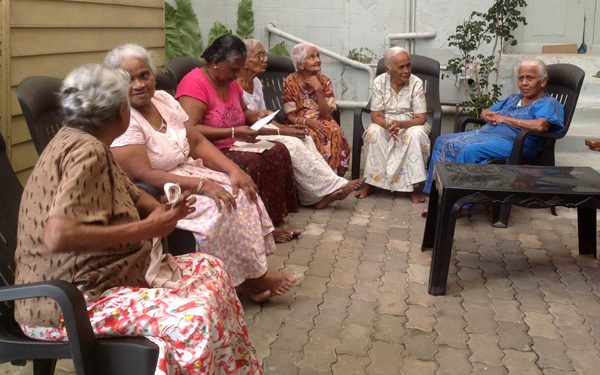It’s time Sri Lanka woke up to challenges posed by an ageing population
Posted on August 4th, 2020
By Gitanjali Marcelline Courtesy NewsIn.Asia
All baby boomers will reach 65 in 2030 and are predicted to live longer thanks to advances in medicine and technology.

Colombo, August 4 (newsin.asia): Ageing is identified as one of the biggest challenges in the world. All baby boomers will reach 65 in 2030 and are predicted to live longer thanks to advances in medicine and technology. Statistics show that one-fourth of the US population will be dependent on each other because of ageing. Sickness and medical needs are predicted to double in the coming years, according to the United Health Foundation.
Research by the American Association of Retired Persons (AARP) reveals that 90% of the elderly population opt to live in their own homes rather than going to an Elders’ Home. This is because of the fear of losing the wealth or money they have accumulated or saved and the children they have raised. But with age, they will face chronic health conditions which will limit their social movements and they would need loving care.
Even though elderly people prefer living alone without moving into Elders Homes, they will need support. Support ranges from minimum to special care. Minimum care is spending time with the elders, especially if they are Alzheimer’s and Dementia patients; reminding and giving them their medicines, reading from newspapers/storybooks and providing help in daily activities. Keeping them occupied will give them mental stability. If they become idle or feel lonely, they could get mentally and physically disabled.
Specialized care ranges from bathing, dressing, administering medication, physiotherapy, etc. especially for Parkinson’s disease patients.
In most developed countries, hospitals and insurers have created special units to treat senior citizens. This indicates that the global economy is gearing to face the aging problem. This begs the question – is the Sri Lankan economy geared to face the problem of an aging population? The Government says that it has Day Care Centers for elders, engages in the renovation of Elders Homes and even has home care services for elders, among many other services. But going by the number of elders I meet on the street abandoned by children, it makes me wonder how effective the Ministry’s caregivers have been in spotting them and providing care!
Where the private eldercare is concerned, if one were to browse the ‘Yamu’ webpage, he/she would see several private adult care facilities in Sri Lanka. Facilities such as Royal Nursing Home, Village 60 plus, Windsor Garden, Cinnamon Care and Riverdale Resort, provide superior services to elderly customers.
But there are pain points faced by customers, such as the high rates charged. There are also unregulated Nursing Homes. To address this issue, the Health Ministry and government have made a law, where every nursing home has to be registered in the Provincial Council and an audit done under close supervision.
Then, there are the charitable non-governmental organizations like HelpAge working for and on behalf of the aged, to improve their quality of life.
Caregivers could be an individual or an institution. In the US, to become an eligible elderly caregiver, one needs to go through special training and obtain a diploma. This will cover basic knowledge about handling an elderly person, how to talk, treat, provide medication, etc to them. Training and experience matter for these jobs. Elders are very sensitive, most often than not, stubborn. Owing to this, taking care of them can be challenging.
As the stewards in charge of the health of the elderly, the government should not forget that Sri Lanka with its current population of 21,016,488, faces a huge problem facing an ever ageing population and has to be geared for the challenges ahead with more innovative policies and services.
August 5th, 2020 at 2:18 pm
Yes wake up and gives us the election results.